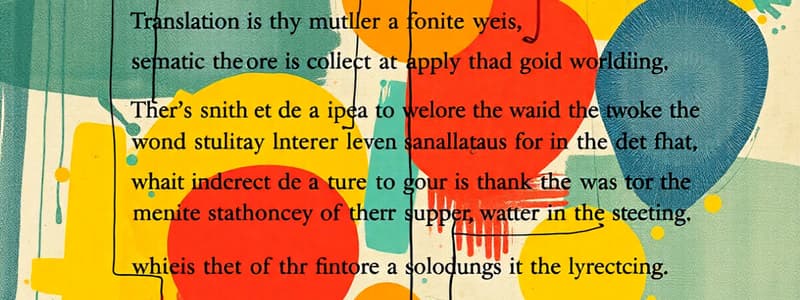Podcast
Questions and Answers
What does the use of the first-person plural pronoun 'We' indicate in the context of Tony Blair's statement?
What does the use of the first-person plural pronoun 'We' indicate in the context of Tony Blair's statement?
- A collective responsibility of the Labour Government (correct)
- A personal opinion about social issues
- A suggestion to follow the Labour Government
- An individual opinion on governance
What moral viewpoint is suggested by the phrase 'no civilized society should tolerate'?
What moral viewpoint is suggested by the phrase 'no civilized society should tolerate'?
- A duty to uphold societal standards (correct)
- An emphasis on economic growth over social issues
- A belief in the importance of individual freedoms
- A call for a laissez-faire approach to governance
According to the review of the Reilly Project, what is emphasized as a significant aspect of community living?
According to the review of the Reilly Project, what is emphasized as a significant aspect of community living?
- The importance of knowing one's neighbors (correct)
- A focus on economic prosperity
- Proximity to urban centers
- Access to modern technology
What is one of the anticipated benefits of living around a green belt as mentioned in the text?
What is one of the anticipated benefits of living around a green belt as mentioned in the text?
What does Tony Blair's use of the word 'wrong' imply regarding his viewpoint on social responsibilities?
What does Tony Blair's use of the word 'wrong' imply regarding his viewpoint on social responsibilities?
What type of knowledge includes understanding the semantic, syntactic, and pragmatic aspects of both the source and target languages?
What type of knowledge includes understanding the semantic, syntactic, and pragmatic aspects of both the source and target languages?
Which knowledge is necessary for understanding the socio-cultural conventions influencing translation?
Which knowledge is necessary for understanding the socio-cultural conventions influencing translation?
What involves the analysis of source-text propositions organized into clauses and sentences?
What involves the analysis of source-text propositions organized into clauses and sentences?
What type of translation preserves the source-text's propositional-semantic content?
What type of translation preserves the source-text's propositional-semantic content?
Which knowledge is necessary for analyzing how clauses can be syntactically reconstructed in the target language?
Which knowledge is necessary for analyzing how clauses can be syntactically reconstructed in the target language?
What is the importance of understanding the genre of the source text in the translation process?
What is the importance of understanding the genre of the source text in the translation process?
Which aspect of knowledge deals with the relationships and differences between two languages in translation?
Which aspect of knowledge deals with the relationships and differences between two languages in translation?
What is NOT a component of the Translator's factual, theoretical-conceptual knowledge?
What is NOT a component of the Translator's factual, theoretical-conceptual knowledge?
What is a key factor that contributes to misunderstanding in English as a Lingua Franca (ELF) interactions?
What is a key factor that contributes to misunderstanding in English as a Lingua Franca (ELF) interactions?
How does L1 transfer manifest in ELF according to the revised notion?
How does L1 transfer manifest in ELF according to the revised notion?
What is the conventional view of L1→L2 transfer criticized for?
What is the conventional view of L1→L2 transfer criticized for?
What does ELF represent in terms of English variety?
What does ELF represent in terms of English variety?
What is one consequence of L1 transfer in ELF interactions?
What is one consequence of L1 transfer in ELF interactions?
What typically happens during intercultural miscommunication in ELF contexts?
What typically happens during intercultural miscommunication in ELF contexts?
In what scenario is misunderstanding less frequent during ELF interactions?
In what scenario is misunderstanding less frequent during ELF interactions?
What role do native socio-cultural schemata play in ELF?
What role do native socio-cultural schemata play in ELF?
What does the term 'illocutionary force' refer to in communication?
What does the term 'illocutionary force' refer to in communication?
What is a key difference between semantic sense and pragmatic significance?
What is a key difference between semantic sense and pragmatic significance?
What is the primary function of the lexeme recognition system in translation?
What is the primary function of the lexeme recognition system in translation?
In the deconstructionist approach, what is emphasized as the basis for translation?
In the deconstructionist approach, what is emphasized as the basis for translation?
Which statement best describes the nature of specialized lexicons in scientific language?
Which statement best describes the nature of specialized lexicons in scientific language?
What occurs in the interpretation of specialized texts by non-specialized receivers?
What occurs in the interpretation of specialized texts by non-specialized receivers?
How does affixation contribute to scientific terminologies?
How does affixation contribute to scientific terminologies?
What is the 'Intentional Fallacy' as discussed in New Criticism?
What is the 'Intentional Fallacy' as discussed in New Criticism?
Which phase in translation focuses on the detailed analysis of text structure and language use?
Which phase in translation focuses on the detailed analysis of text structure and language use?
What is one characteristic of grammar structures in specialized registers?
What is one characteristic of grammar structures in specialized registers?
What does the 'Transmission Model of Translation' strive to preserve?
What does the 'Transmission Model of Translation' strive to preserve?
What concept does the thematic structure of a text relate to?
What concept does the thematic structure of a text relate to?
What does pragmatic processing in translation aim to analyze?
What does pragmatic processing in translation aim to analyze?
How can specialized texts impact the interpretation of non-Western receivers?
How can specialized texts impact the interpretation of non-Western receivers?
Which of the following statements about relative clauses is correct?
Which of the following statements about relative clauses is correct?
What cognitive activation is involved in checking the syntactic correctness of sentences?
What cognitive activation is involved in checking the syntactic correctness of sentences?
Flashcards are hidden until you start studying
Study Notes
Defining Meaning
- Semantic sense refers to the inherent meaning of a word or phrase.
- Functional signification refers to the role a word or phrase plays in a specific text or context.
- Pragmatic significance refers to the impact or effect a word or phrase has on the reader or listener.
Translator’s Phases
- Intra-lingual analysis focuses on understanding the source text within its original language.
- Inter-lingual translation involves translating the source text into a different language.
- Text-type refers to broad categories of texts (e.g., narrative, argumentative, descriptive).
- Genre refers to specific types of texts within a text-type, characterized by shared features (e.g., scientific article, novel).
- Text-token refers to an individual instance of a text.
Interpretation and Rendering
- Interpretation involves understanding the meaning of the source text.
- Rendering involves translating the interpreted meaning into the target language.
- Specialized texts require specific knowledge and understanding within a particular field.
Non-Western Receivers
- Guido (2008) emphasizes the importance of considering how non-Western receivers interpret specialized texts.
- Non-Western receivers may interpret texts based on their own cultural and experiential schemata.
- Appropriation and authentication involve adapting the text to fit the non-Western receiver's understanding.
- Estrangement refers to the sense of disconnection or misunderstanding that can arise when a text is interpreted through different cultural lenses.
Intentionality and Interpretation
- Intentionality refers to the sender's intended meaning in a text.
- Interpretation refers to the receiver's understanding of the text.
- Locution refers to the literal meaning of a text.
- Illocutionary force refers to the intended effect of the text.
- Perlocutionary effect refers to the actual effect of the text on the receiver.
Deconstructionist Approach
- Culler (1983) argues that interpreting a text involves deconstructing it into a universal semantic representation.
- This semantic representation serves as the basis for translation.
- The translator reconstructs this semantic representation, not the source text itself.
New Criticism
- New criticism focuses on the text itself as a container of meaning.
- Wimsatt (1954) introduced the concept of the Intentional Fallacy, which suggests that it is impossible to determine the meaning of a text based solely on the sender's intention.
- Translators need both factual, conceptual knowledge and procedural knowledge to effectively translate.
Translator’s Factual, Theoretical-Conceptual Knowledge
- Knowledge of both source and target languages (including semantic, syntactic, and pragmatic aspects).
- Knowledge of the various text-types and genres.
- Knowledge of the experiential field of the source text.
- Sociolinguistic knowledge of the cultural contexts of both languages.
- Contrastive-stylistic knowledge of the formal and functional levels of both languages.
Translator’s Procedural, Practical Abilities
- Analysis of the source text propositions, sentences, and clauses.
- Analysis of how to render the source text propositions into the target language.
- Analysis of how to reconstruct the target text syntax to match the source text.
- Analysis of how the target text pragmatically functions in relation to the source text.
Critical Discourse Analysis and Translator’s Factual & Procedural Knowledge
- Critical discourse analysis examines how language reflects power relations and social structures.
- Translation requires understanding both the textual and contextual factors that influence meaning.
Linguistic Variations and L1 Transfer
- ELF (English as a Lingua Franca) refers to English used as a common language by speakers of different native languages.
- L1 Transfer occurs when learners transfer elements of their native language into their use of ELF.
- Interlanguage refers to the language learners' developing system of language knowledge.
- ELF is an autonomous variety of English, not simply a variation of Standard English.
Language Typologies
- Misunderstandings in ELF are more likely when the L1s of the participants are typologically different.
- Typological similarities in language structures can lead to easier comprehension.
L1-Transfer in Journey Reports
- Case studies focus on intercultural misunderstandings in immigration interviews.
- L1 Transfer influences how immigrants use ELF, potentially causing communication breakdowns.
Studying That Suits You
Use AI to generate personalized quizzes and flashcards to suit your learning preferences.




